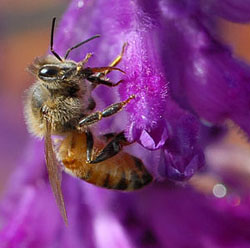 Honey bee on salvia. (Photo by Kathy Keatley Garvey)
Honey bee on salvia. (Photo by Kathy Keatley Garvey) How to Donate
We receive many requests asking how to donate to honey bee research at the Harry H. Laidlaw Jr. Honey Bee Research Facility at UC Davis.
Here's how to donate (see below). For major gifts or inquiries, contact:
Martha Ozonoff
Development Officer
College of Agricultural and Environmental Sciences
mjozonoff@ucdavis.edu
Office: (530) 752-1504
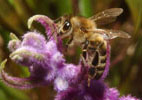 Honey Bee Research. Funds to the “Honeybee Research Program” are used to further bee research at the Harry H. Laidlaw Jr. Honey Bee Research Facility. Click to donate online. Or, you may write a check to "UC Regents," with the subject line "Honey Bee Research" and mail to UC Davis Department of Entomology, One Shields Ave., Davis, CA 95616.
Honey Bee Research. Funds to the “Honeybee Research Program” are used to further bee research at the Harry H. Laidlaw Jr. Honey Bee Research Facility. Click to donate online. Or, you may write a check to "UC Regents," with the subject line "Honey Bee Research" and mail to UC Davis Department of Entomology, One Shields Ave., Davis, CA 95616.
Research received a big boost in 2008 when Häagen-Dazs donated $100,000 to UC Davis and launched a help-the-honey-bees website.
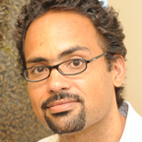 Brian Johnson. His lab studies the genetics, behavior, evolution, and health of honey bees. They use experimental and theoretical approaches to all the questions they explore. Current work in the lab focuses on the evolution and genetic basis of social behavior using comparative and functional genomics, task allocation using behavioral and theoretical approaches, and honey bee health using a combination of genetics, epidemiology, and physiological approaches. To donate, write a check to "UC Regents" with the subject line, "Brian Johnson Research" and mail to the UC Davis Department of Entomology, One Shields Ave., Davis, CA 95616.
Brian Johnson. His lab studies the genetics, behavior, evolution, and health of honey bees. They use experimental and theoretical approaches to all the questions they explore. Current work in the lab focuses on the evolution and genetic basis of social behavior using comparative and functional genomics, task allocation using behavioral and theoretical approaches, and honey bee health using a combination of genetics, epidemiology, and physiological approaches. To donate, write a check to "UC Regents" with the subject line, "Brian Johnson Research" and mail to the UC Davis Department of Entomology, One Shields Ave., Davis, CA 95616.
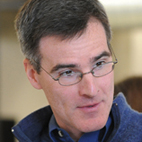 Neal Williams. His research addresses basic questions about bee ecology, evolution and behavior. It explores the intricacies of pollinator-floral interactions from animal and plant perspectives. It seeks to understand the persistence of pollinator populations, pollinator and plant communities and pollination in the context of global change. To donate, write a check to "UC Regents" with the subject line, "Neal Williams Research" and mail to the UC Davis Department of Entomology, One Shields Ave., Davis, CA 95616.
Neal Williams. His research addresses basic questions about bee ecology, evolution and behavior. It explores the intricacies of pollinator-floral interactions from animal and plant perspectives. It seeks to understand the persistence of pollinator populations, pollinator and plant communities and pollination in the context of global change. To donate, write a check to "UC Regents" with the subject line, "Neal Williams Research" and mail to the UC Davis Department of Entomology, One Shields Ave., Davis, CA 95616.
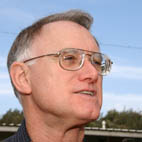
Cooperative Extension. This supports the outreach programs of Cooperative Extension apiculturist Eric Mussen, internationally known for his bee expertise. Make checks to “The UC Regents,” with the subject line: "Eric Mussen, Cooperative Extension.” Mail check to the UC Davis Department of Entomology, One Shields Ave., Davis, CA 95616.
Mussen, who joined the UC Davis Department of Entomology in 1976, is widely sought for his expertise on colony collapse disorder, honey bee nutrition, diseases, pesticides, crop pollination and beekeeping. He writes the bimonthy newsletter, from the UC Apiaries, and Bee Briefs.
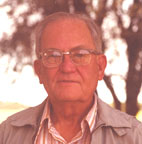 Laidlaw Endowment. Harry Hyde Laidlaw Jr. (1907-2003) was considered the “father of honey bee genetics.” He joined the UC Davis Department of Entomology in 1947, retiring in 1974. He remained active in his research and outreach programs until shortly before his death at age 96.
Laidlaw Endowment. Harry Hyde Laidlaw Jr. (1907-2003) was considered the “father of honey bee genetics.” He joined the UC Davis Department of Entomology in 1947, retiring in 1974. He remained active in his research and outreach programs until shortly before his death at age 96.
Make checks to “The UC Davis Foundation,” with the subject line, “Laidlaw Endowment.” The university takes 6 percent in overhead costs the first (and only) year. A portion of the funds is used to support students working in honey bee biology. Mail check to the UC Davis Department of Entomology, One Shields Ave., Davis, CA 95616.
 Bee Biology Facility Support. Make checks to “The UC Regents,” with the subject line, “Bee Biology Facility Support.” The university takes 6 percent in overhead costs the first (and only) year of the contribution. This supports facility improvements.
Bee Biology Facility Support. Make checks to “The UC Regents,” with the subject line, “Bee Biology Facility Support.” The university takes 6 percent in overhead costs the first (and only) year of the contribution. This supports facility improvements.
The 8,200 square-foot Laidlaw facility is home to laboratories, a honey bee food processing room, a large multipurpose room, glassed observation hives, offices and a wood shop. Mail check to the UC Davis Department of Entomology, One Shields Ave., Davis, CA 95616.
 Häagen-Dazs Honey Bee Haven. Make checks to “The UC Regents,” with the subject line, “Bee Garden.” This is a half-acre pollinator garden located next to the Harry H. Laidlaw Jr. Honey Bee Research Facility. It is open throughout the year from dawn to dusk. Admission is free. Volunteers--many of whom are UC Master Gardeners--tend to the plants every Friday morning, weather permitting. Those who donate $1000 will have their name engraved beneath the bee sculpture. Presently, the garden has self-guided tours, but plans call for guided tours.
Mail check to the UC Davis Department of Entomology, One Shields Ave., Davis, CA 95616.
Häagen-Dazs Honey Bee Haven. Make checks to “The UC Regents,” with the subject line, “Bee Garden.” This is a half-acre pollinator garden located next to the Harry H. Laidlaw Jr. Honey Bee Research Facility. It is open throughout the year from dawn to dusk. Admission is free. Volunteers--many of whom are UC Master Gardeners--tend to the plants every Friday morning, weather permitting. Those who donate $1000 will have their name engraved beneath the bee sculpture. Presently, the garden has self-guided tours, but plans call for guided tours.
Mail check to the UC Davis Department of Entomology, One Shields Ave., Davis, CA 95616.
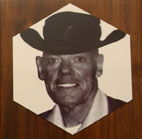 Charles R. Duncan Endowment. Charles R. Duncan (1926-2003) was a Santa Monica resident and retired aerospace engineer who kept bees as a hobby. He was an avid supporter of honey bees and beekeeping. Make checks to “The UC Davis Foundation,” with the subject line, “Charles R. Duncan Endowment.” The interest on this endowment supports students studying honey bee biology. Mail checkl to the UC Davis Department of Entomology, One Shields Ave., Davis, CA 95616.
Charles R. Duncan Endowment. Charles R. Duncan (1926-2003) was a Santa Monica resident and retired aerospace engineer who kept bees as a hobby. He was an avid supporter of honey bees and beekeeping. Make checks to “The UC Davis Foundation,” with the subject line, “Charles R. Duncan Endowment.” The interest on this endowment supports students studying honey bee biology. Mail checkl to the UC Davis Department of Entomology, One Shields Ave., Davis, CA 95616.
Duncan served as president of the Los Angeles County Beekeepers' Association and the Western Apicultural Society, and was a lifetime honorary member of the California State Beekeepers' Association.
For major gifts or inquiries:
Martha Ozonoff
Development Officer
College of Agricultural and Environmental Sciences
mjozonoff@ucdavis.edu
Office: (530) 752-1504